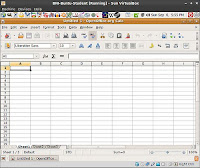I know, most people play video games, or watch TV, or do any number of other things, so why would I be sitting here playing with spreadsheets?

These aren't just any spreadsheets. These are my Financial Spreadsheets. No Quicken or Microsoft Money here -- just give me Excel, a bunch of formulas, and turn me loose. I've got a spreadsheet for our checking account online, for our local checking account, for our savings accounts, for our remaining mortgage, for our remaining student loans -- you name it, I probably have a spreadsheet for it.
My spreadsheet does just what a program like Quicken will do -- I can look and see where our money came from and where it went, but my spreadsheet goes further. I have my spreadsheets filled out with income and expenses through the end of 2012. I know reasonably well when our paychecks will arrive, and I have those in the spreadsheet. I know when our bills are due, and they're there, too. I have all the sheets for all the accounts cross-referenced, so when I take an extra $25 or $50 from our checking account and throw it toward the mortgage, it not only deducts the amount from checking, it changes the mortgage sheet and tells me what effect that will have on what we owe.
To play it safe, I underestimate our income and overestimate our bills. Both my wife and I usually get annual raises. To give these spreadsheets a feel of "worst case scenario", I don't put in those raises. I get paid hourly, so I also assume that during no pay period will I work a full ten days. As for expenses, I look at our worst months on our bills, and that tends to be what I put down for the amount due every month. That way, on those months which are slightly worse than the others, we're not caught with our financial pants down.
I'm an Excel junkie -- I admit it. I probably spend three or four hours a week just looking at these spreadsheets, playing. "I wonder how it would effect our debt if we could cut out a hundred dollars a month from our credit card bill?" (We put all our purchases on our credit card and pay them off in full every month -- no balances there at 18%, thank heavens.) I have only to go through and change the amounts, and I can see exactly what it will do. "What if I took on another two piano students every week?" I can add those amounts in easily enough and see, to a reasonable degree of accuracy, what it will do.
The upshot of all of this is that I'm aware -- almost pathologically so -- of where our money comes from, where our money goes, and what our money is likely to do in both the near and far future. These sheets help me see the big picture. They also let me manipulate our finances without actually risking those hard earned dollars -- just like a general moving little green men across a tabletop map of a battlefield, I can see what happens if the money I make teaching piano lessons declares war on our mortgage.
Is this the most convenient way to keep track of our money? No, probably not, but it works for me, and it gives me a feeling of power, since I know what our money is doing. Will this work for everyone? No, probably not, but just considering it as an option for taking control of your financial future might cause you to come up with a method you might not have thought of otherwise.
So, dear readers, let us know -- how do you keep track of your money?
No comments:
Post a Comment